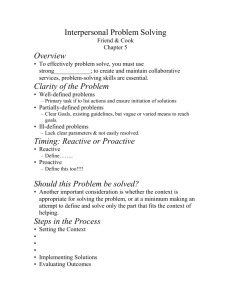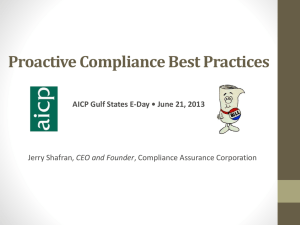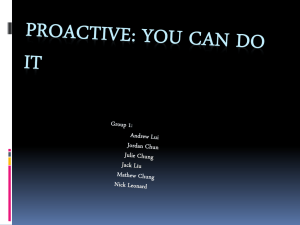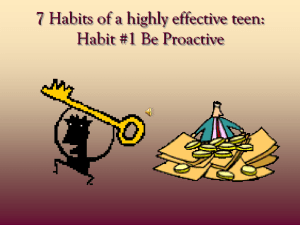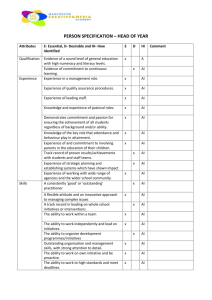Face Value Communications
advertisement
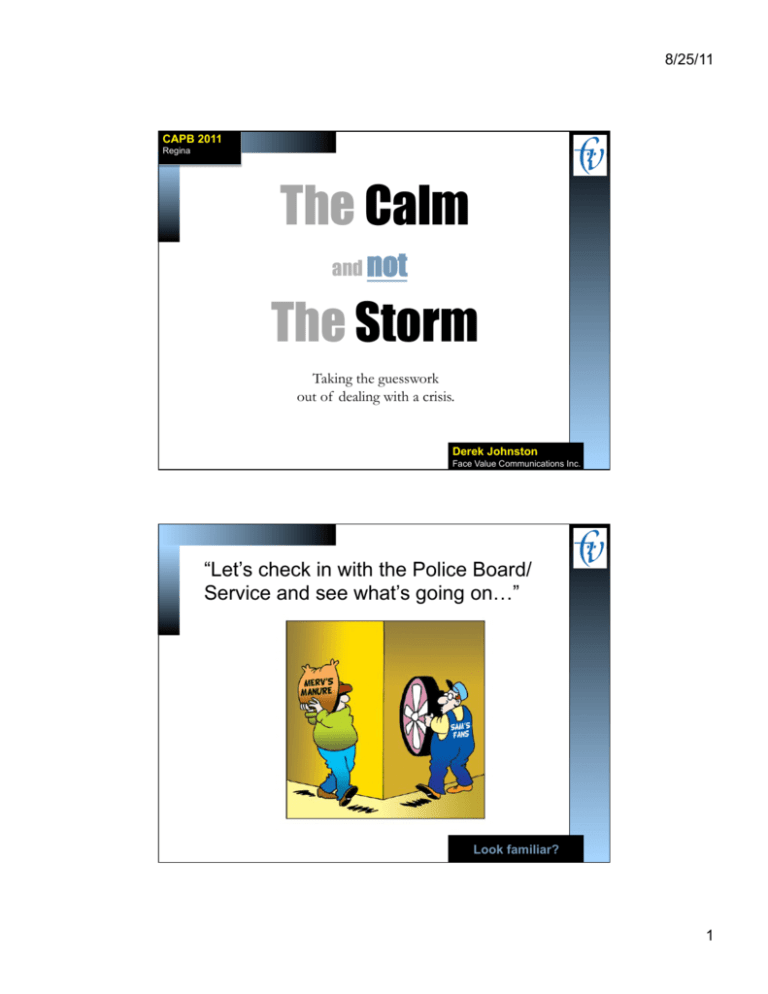
8/25/11 CAPB 2011 Regina The Calm ! and not! The Storm ! Taking the guesswork out of dealing with a crisis. Derek Johnston Face Value Communications Inc. “Let’s check in with the Police Board/ Service and see what’s going on…” Look familiar? 1 8/25/11 Some days, “policing” and “crisis” seem synonymous. What does that mean for Police Boards? “Bonds, Stacy Bonds” So, what brings you here? Sucker for punishment? 2 8/25/11 The element of surprise… What do professional hockey and elite water polo have in common? Don’t delude yourself… The CRISIS is coming! (if it hasn’t already!) Hang on for the ride! 3 8/25/11 Today’s Targets 1. Interaction and fun 2. Better understanding of the dynamics of “crisis” 3. Tips on how to manage one and… 4. …how to prevent one! text Today’s Targets 5. Exposure to proven principles 6. Potholes to avoid 7. Your short-term Action Plan 4 8/25/11 Approach 1. Ready? 2. Aim… 3. Fire! 1. Ready? • Issue vs. crisis Definitions 5 8/25/11 Issue A perceived problem, with expectations by key stakeholders for prompt resolution. An issue is usually… • Long-standing, slowly developing, or predictable that impacts on an industry or sector; • Something that can be identified, monitored and managed as it emerges; • Often brought into the public arena (or at least fuelled) by protagonists or activists and reported in the media. 6 8/25/11 text You think YOU’VE got issues… 7 8/25/11 Issue Management A proactive approach to problem solving: - dependent on using internal and external networks and relationships to alert the organization that a problem is brewing and, - to tackle issues that can have operational, political, financial, social, or technological consequences. 8 8/25/11 … is about facing up to difficult scenarios, picking the issues early, building the networks which will deliver information and influence, understanding exactly where the opposition is coming from, and doing something about it early enough to make a difference. Take control! Why bother? • Put into context • Influence media coverage • Reach key influencers • Build and maintain reputation & relationships • Reduce exposure to risk • Align with strategic direction and policy development • Capitalize on opportunities 9 8/25/11 Issue Management Process Take active leadership to manage issue Issue Identified Yes Yes Yes Can we exert influence on it? Is it likely to impact us? No Not currently an issue for us No Monitor for changes Issue Are we willing to commit resources? Yes Do we do this alone? No Monitor for changes No Coalition/ support building Crisis 10 8/25/11 Organisations that don’t manage issues are jeopardising control of their own destiny. Planned action gives way to ad hoc reaction. Issues management becomes crisis management. Crisis 11 8/25/11 There’s no excuse! Although some risks are beyond your control, others can be foreseen. Research shows that the vast majority of crises arise when organizations fail to identify a potentially contentious issue at an earlier, more benign stage, and to develop a plan of action to manage the issue - before the issue manages them. David Weiner National Public Relations Crisis Communications A reactive approach that uses timely, targeted communication to mitigate the damage to an organization’s reputation, relationships, and overall effectiveness. 12 8/25/11 Objectives • Maintain public confidence • Minimize fear and confusion • Influence public debate & stakeholder reaction • Encourage third party endorsements • Preserve or enhance reputation • Internally - minimize disruptions to service, preserve morale The Gold Standard. 13 8/25/11 Why bother? Planning for a crisis, a turning point – is the art of removing much of the risk and uncertainty to allow you to achieve more control over your own destiny. The organization that weathers a crisis well understands that opportunity can come out of adversity. A well managed crisis response, coupled with an effective recovery program, will leave stakeholders with a favourable impression and renewed confidence in the organization. You won’t be judged so much for the crisis itself – which may have been outside your control – but by your response to it. 14 8/25/11 Issue Mgmt vs. Crisis Comms Proactive, fixing problems before they occur. Reactive, after they’ve occurred. Medium to long-term. Immediate. Multi-faceted and often complex. Clear focus, tasks are obvious. Planning takes advantage of Forget the opportunities opportunities and avoids the - you’re dealing with the worst case scenario. worst case scenario. 15 8/25/11 Guiding Principles Hope for the best… 16 8/25/11 but PLAN for the worst… PLAN some more 17 8/25/11 Validate your PLAN Re-visit your PLAN annually 18 8/25/11 Did I mention… PLAN ? Elements of the PLAN • Objectives – what are you trying to achieve? • Audiences – who are you trying to reach? • Approach – who speaks to what? • Messages – core themes that folks need to hear? • Tools & Tactics – how are you delivering those messages? • Evaluation – did you achieve your objectives? 19 8/25/11 Be PROACTIVE Proactive “Good” Reactive “Bad” Be PROACTIVE Proactive = “Information” Reactive = “Explanation” 20 8/25/11 Be PROACTIVE Taking Action 6 words that will save your bacon Mess up Fess up Dress up 21 8/25/11 Play nicely with others… …and don’t… Be QUICK! Can you stop the bleeding, set the fractures, and stabilize the patient? Can you improve the chances for survival in the first hour? 22 8/25/11 Tell as much as you can. Tell the truth. Tell it fast. Be first. Be right. Be credible. 23 8/25/11 You just never know… Sir Paul Stephenson Express genuine empathy. “Perfect” game? 24 8/25/11 Keep ‘em honest Correct factual errors and address misconceptions immediately Look inside and outside Make internal communications a priority… …not an afterthought. 25 8/25/11 Other Common Pitfalls No No PLAN! PLAN! • Police misconduct – who says what? • Police budgets – who says what? • Police policies – who says what? • Other jurisdictions – who says what? • Nasty editorial – who says what? 26 8/25/11 Other Common Pitfalls You wait to tell the whole story instead of releasing it chapter by chapter. 27 8/25/11 Other Common Pitfalls No Capacity! Other Common Pitfalls Bogged down in process. 28 8/25/11 So what? What does all this mean for your agency and your Police Board? 1. Build a Strategy a. Issue Management Function - formalize regular access to reliable internal and external networks - monitor mainstream and social media - build relationships with your key stakeholders - review key crime, demographic and socioeconomic data 29 8/25/11 1. Build a Strategy b. Start close to home - Develop/review Board policies and procedures - Build the strategy in collaboration with the Police Service and your partners - Mow your own grass! 1. Build a Strategy c. Reach out - Leverage existing opportunities to educate and engage - Demonstrate your value to the community - Maximize the down time! 30 8/25/11 1. Build a Strategy d. Evaluate how you’re doing - Regularly assess how well you’re achieving the stated objectives - Formal and informal mechanisms 2. GET READY! Work with your partners on some realistic scenarios: • confirm roles and responsibilities • prepare your spokespeople • de-brief and adjust your plans • talk to your colleagues in other cities 31 8/25/11 When it works… - it’s straightforward - it’s clear - it’s direct - it’s 2-way - it’s simpler than you think… When it works… 32 8/25/11 Questions? Comments? Thank you Enjoy your night! 33 8/25/11 Resources • !!"#$#$%&%'()"*)+,-%.#$/%!0((1+#,230+$4%50"%6)27)"$% 8-%6)27)"$%"#$%&$'(!)*'!+,($-($!#*%&'*./! • %9.%:2#6-%0!$12$..$%&!($.$23*%!*)!&*4,2-.!,((5$(!)'*6! (*2,-.!6$7,-!&*!2',(,(!2*66(!!!!!!!!!!!!!!!!!!!!!!!!!!!!!!!!!!!!!! 894:;;<<<=4'7-,.>=2*6;?-,%;@*6$=-(41!%% • %;)++)$%92-+<)"%!"#$#$%!0((%&%=)7#2%.)6230+$%'> ?)@$6)A)"4%@@@B,"#$#$,0((1+#,230+$B,0(%% • %A$&$'!B-%76-%4%<<<=4(-%76-%=2*6!! Derek Johnston (613) 794-1876 derek@face-value.ca SKYPE: facevaluecomms Thank you! 34
